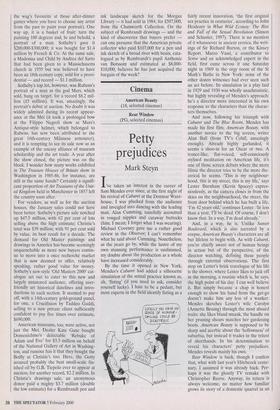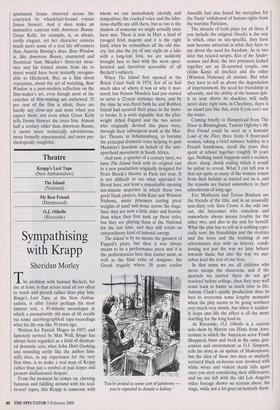Cinema
American Beauty (18, selected cinemas) Rear Window (PG, selected cinemas)
Petty prejudices
Mark Steyn
I've taken an interest in the career of Sam Mendes ever since, at the first night of his revival of Cabaret at the Donmar Ware- house, I was plucked from the audience and inveigled into dancing with the leading man, Alan Cumming, tastefully accoutred in rouged nipples and cutaway buttocks (him, I mean; I forget what I was wearing). Michael Coveney gave me a rather good review in the Observer; I can't remember what he said about Cumming. Nonetheless, as the years go by, while the lustre of my own stunning performance is undimmed, my doubts about the production as a whole have increased considerably.
By the time it opened in New York, Mendes's Cabaret had added a silhouette simulation of the sexual practice known as, ah, 'fisting' (if you need to ask, consider yourself lucky). I hate to be a pedant, but most experts in the field identify fisting as a fairly recent innovation, 'the first original sex practice in centuries', according to John Heidenry in What Wild Ecstasy: The Rise and Fall of the Sexual Revolution (Simon and Schuster, 1997), There is no mention of it whatsoever in ancient erotica, the writ- ings of Sir Richard Burton, or the Kinsey Report. Marco Vassi, a contributor to Screw and an acknowledged expert in the field, first came across it one Saturday night in 1969 in the orgy room of the St Mark's Baths in New York: none of the other dozen witnesses had ever seen such an act before. Its simulation in a play laid in 1929 and 1930 was wholly anachronistic, but highly revealing of Mendes's approach: he's a director more interested in his own response to the characters than the charac- ters themselves.
And now, following his triumph with Cabaret and The Blue Room, Mendes has made his first film, American Beauty, with another novice to the big screen, writer Alan Ball (from TV's Cybill, amazingly enough). Already highly garlanded, it seems a shoo-in for an Oscar or two. A trance-like, flat-voiced, self-consciously stylised meditation on American life, it's one of those screen debuts where the more filmic the director tries to be the more the- atrical he seems. 'This is my neighbour- hood, this is my street, this is my life,' says Lester Burnham (Kevin Spacey) expres- sionlessly, as the camera closes in from the skies on the neighbourhood, the street, the front door behind which he has built a life. 'I'm 42 years old,' continues Lester. 'In less than a year, I'll be dead. Of course, I don't know that. In a way, I'm dead already.'
And, in a way, he is. Unlike Sunset Boulevard, which is also narrated by a corpse, American Beauty's characters are all but lifeless to begin with. As with Cabaret, you're chiefly aware not of human beings in action but of the perspective, of the director watching, defining these people through external observations. The first stop on Lester's brisk travelogue of his life is the shower, where Lester likes to jack off in the morning, a routine which is, he says, the high point of his day. I can well believe it. But simply because a chap is honest enough to show his hand from the get-go doesn't make him any less of a wanker. Mendes sketches Lester's wife Carolyn (Annette Bening) through the most absurd traits: she likes bland muzak, the handle on her pruning shears matches her gardening boots. American Beauty is supposed to be sharp and acerbic about the 'hollowness' of suburbia, but instead it trades in the tritest of shorthands. In his determination to reveal his characters' petty prejudices, Mendes reveals mainly his own.
Rear Window is back, though I confess that, what with last year's Hitchcock cente- nary, I assumed it was already back. Per- haps it was the ghastly TV remake with Christopher Reeve. Anyway, its return is always welcome, no matter how familiar grows its story of a domestic quarrel in an apartment house observed across the courtyard by wheelchair-bound voyeur James Stewart. And it does make an instructive contrast with American Beauty. Grace Kelly, for example, is, as always, coolly elegant, yet her character conveys much more sense of a real life off-camera than Annette Bening's does. Rear Window is, like American Beauty, mannered and theatrical: Sam Mendes's three-act struc- ture and his formal zooms from sky to street would have been instantly recognis- able to Hitchcock. But, as a film about voyeurism, about the act of watching, Rear Window is a post-modern reflection on the film-maker's art, even though most of the crutches of film-making are eschewed: 35 per cent of the film is silent, there are hardly any close-ups and none when you expect them, not even when Grace Kelly tells Jimmy Stewart she loves him. Almost half a century older than American Beauty, it seems more technically adventurous, more formally experimental, and more psy- chologically insightful.



























































 Previous page
Previous page